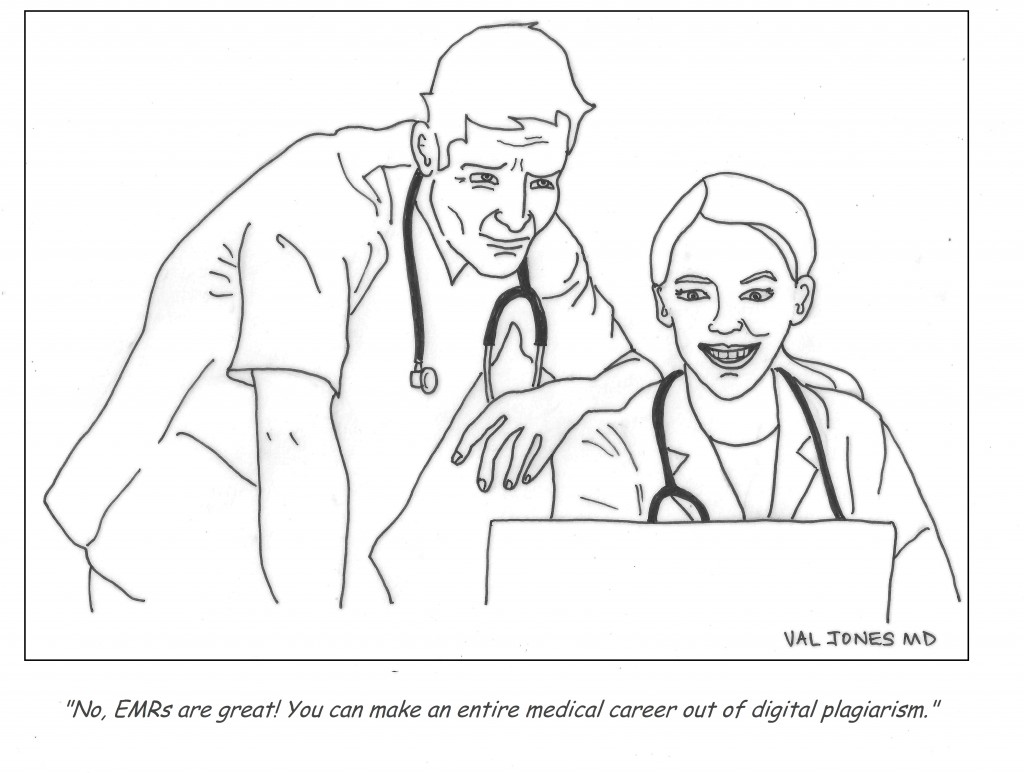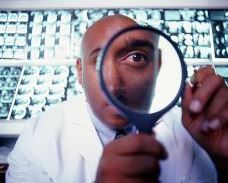Cartoon: Why Some Doctors Love EMRs


 Health screening is part of good preventive care, though over-screening can lead to increased costs, and potential patient harm. Healthcare professional societies have recently developed excellent public service announcements describing the dangers of over-testing, and new research suggests that though additional medical interventions are associated with increased patient satisfaction, they also lead (ironically) to higher mortality rates.
Health screening is part of good preventive care, though over-screening can lead to increased costs, and potential patient harm. Healthcare professional societies have recently developed excellent public service announcements describing the dangers of over-testing, and new research suggests that though additional medical interventions are associated with increased patient satisfaction, they also lead (ironically) to higher mortality rates.
And so, in a system attempting to shift to a “less is more” model of healthcare, why is resistance so strong? When the USPSTF recommended against the need for annual, screening mammograms in healthy women (without a family history of breast cancer) between the ages of 40-49, the outcry was deafening. Every professional society and patient advocacy group rallied against the recommendation, and generally not much has changed in the breast cancer screening world. I myself tried to follow the USPSTF guidelines – and opted out of a screening mammogram for two full years past 40. And then I met a charming radiologist at a women’s medical conference who nearly burst into tears when I told her that I hadn’t had a mammogram. Her lobbying for me to “just make sure I was ok” was so passionate that I simply could no longer resist the urge to get screened.
I knew going into the test that there was a reasonably high chance of a false positive result which could cause me unnecessary anxiety. That being said, I was still emotionally unprepared for the radiologists’ announcement that the mammogram was “abnormal” and that a follow up ultrasound needed to be scheduled. I must admit that I did squirm until I had more information. In the end, the “abnormality” proved to be simple “dense breast tissue” and I was pleased to have at least dodged an unnecessary biopsy or lumpectomy. Did my screening do me any good? No, and some psychological harm. A net/net negative but without long term sequelae.
My next personal wrestling match with screening tests was the colonoscopy. I was seeing a gastroenterologist for some GI complaints, and we weren’t 5 minutes into our conversation before he recommended a colonoscopy. I argued that I was too young for a screening colonoscopy (I was 42 and they are recommended starting at age 50), and therefore was doubtful that anything too helpful would be found with the test. My suggestion was that a careful history and some blood testing might be the first place to start. My gastroenterologist acquiesced reluctantly.
As it turns out the blood testing was non-diagnostic and my symptoms persisted so I agreed to the colonoscopy. In this case I felt it was reasonable to do it since it was for diagnostic (not screening) purposes. I was quite certain that it would reveal nothing – or perhaps a false positive followed by anxiety, like my mammogram.
What it did show was some polyps that had a 50% chance of becoming malignant colon cancer in the next 10 years. I was shocked. If I had waited until I was 50 to start screening, I could have missed my cure window. The uneasiness about screening guidelines began to sink in. As a physician I had done my best to apply screening guidelines to myself and resist the urge to over-test, even with a healthy dose of natural curiosity. Yet I failed to resist screening, and in fact, my life was possibly saved by a test that was not supposed to be on my preventive health radar for another 8 years.
 Screening tests are recommended for those who are most likely to benefit, and physicians and patients alike are encouraged to avoid unnecessary testing. But there are always a few people outside the “most likely to benefit” pool whose lives could be saved with screening, and the urge to make sure that’s not you – or your patient – is incredibly strong. I’m not sure if that’s human nature, or American culture. But a quick review of Hollywood blockbuster plots (where tens of thousands of lives are regularly sacrificed to save one princess/protagonist/hero from the aliens/monsters/zombies) testifies to our desperately irrational tendencies.
Screening tests are recommended for those who are most likely to benefit, and physicians and patients alike are encouraged to avoid unnecessary testing. But there are always a few people outside the “most likely to benefit” pool whose lives could be saved with screening, and the urge to make sure that’s not you – or your patient – is incredibly strong. I’m not sure if that’s human nature, or American culture. But a quick review of Hollywood blockbuster plots (where tens of thousands of lives are regularly sacrificed to save one princess/protagonist/hero from the aliens/monsters/zombies) testifies to our desperately irrational tendencies.
I am now biased towards over-testing, because my emotional relief at dodging a bullet is stronger than my cerebral desire to adhere to population-based recommendations. Knowing this, I will still try to avoid the temptation to over-test and over-treat my patients. But if they so much as hint that they’d like an early colonoscopy – I will cave.
Does that make me a bad doctor?
The difference between the healthcare system and the medical care system is very clear to me. The stakeholders in the healthcare system are patients, physicians, government, hospital systems, pharmaceutical companies, pharmacies, pharmacy middlemen, and healthcare insurance companies.
Government, hospital systems, pharmaceutical companies, pharmacies, pharmacy middlemen, and healthcare insurance companies are secondary stakeholders in the healthcare system.
The primary stakeholders are patients and physicians. They also comprise the medical care system. Without the primary stakeholders there would be no need for a healthcare system.
The secondary stakeholders have long ago taken over the healthcare system. All businesses and the government deal with the hand they are dealt using their best judgment. The people running the business or government pursue their vested interest. The difference between businesses and government is businesses work to make as big a profit as possible. Government, depending on the political party in power, pursues fulfillment of its ideology.
Since 1942 and the Economic Stabilization Act of President Roosevelt Read more »
*This blog post was originally published at Repairing the Healthcare System*
 Low back pain is one of the most common conditions to affect humans. More than 80% of Americans experience low back pain at some time in their lives and “chronic” pain is on the rise as people live longer and get heavier. Numerous studies have shown that doctors and patients underutilized exercise as a treatment for chronic back and neck pain even though it has been shown to be effective. A new study was published in the Annals of Internal Medicine that showed yoga to be an effective treatment for chronic low back pain.
Low back pain is one of the most common conditions to affect humans. More than 80% of Americans experience low back pain at some time in their lives and “chronic” pain is on the rise as people live longer and get heavier. Numerous studies have shown that doctors and patients underutilized exercise as a treatment for chronic back and neck pain even though it has been shown to be effective. A new study was published in the Annals of Internal Medicine that showed yoga to be an effective treatment for chronic low back pain.
The study authors took two groups of patients and compared yoga to usual care for chronic or recurrent low back pain. All patients received a back pain education booklet, but the study group also received Read more »
*This blog post was originally published at EverythingHealth*
Hallelujah. At last there is an actual, published paper (full text behind subscription firewall, unfortunately) objectively documenting not only a lack of longevity benefit for several commonly consumed dietary supplements, but a numerical association indicating potential harm. Finally!
Investigators looked at nearly 39,000 women (in scientific terms: a lot) over 19 years of follow up (in scientific terms: a long time) and found increased risk of death in women who took supplemental iron (strongest association), copper, zinc, magnesium, Vitamin B6, and multi-vitamins.
Wow.
If nothing else, that should at least give one pause when considering whether or not to take supplements at all, especially in the demographic studied (the “older female”). But are they overstating their case? Scare-mongering? Not at all. In fact, the following caution was explicitly added by the researchers: Read more »
*This blog post was originally published at Musings of a Dinosaur*
It’s no secret that doctors are disappointed with the way that the U.S. healthcare system is evolving. Most feel helpless about improving their work conditions or solving technical problems in patient care. Fortunately one young medical student was undeterred by the mountain of disappointment carried by his senior clinician mentors…
I am proud to be a part of the American Resident Project an initiative that promotes the writing of medical students residents and new physicians as they explore ideas for transforming American health care delivery. I recently had the opportunity to interview three of the writing fellows about how to…
Book Review: Is Empathy Learned By Faking It Till It’s Real?

I m often asked to do book reviews on my blog and I rarely agree to them. This is because it takes me a long time to read a book and then if I don t enjoy it I figure the author would rather me remain silent than publish my…
The Spirit Of The Place: Samuel Shem’s New Book May Depress You

When I was in medical school I read Samuel Shem s House Of God as a right of passage. At the time I found it to be a cynical yet eerily accurate portrayal of the underbelly of academic medicine. I gained comfort from its gallows humor and it made me…
Eat To Save Your Life: Another Half-True Diet Book

I am hesitant to review diet books because they are so often a tangled mess of fact and fiction. Teasing out their truth from falsehood is about as exhausting as delousing a long-haired elementary school student. However after being approached by the authors’ PR agency with the promise of a…